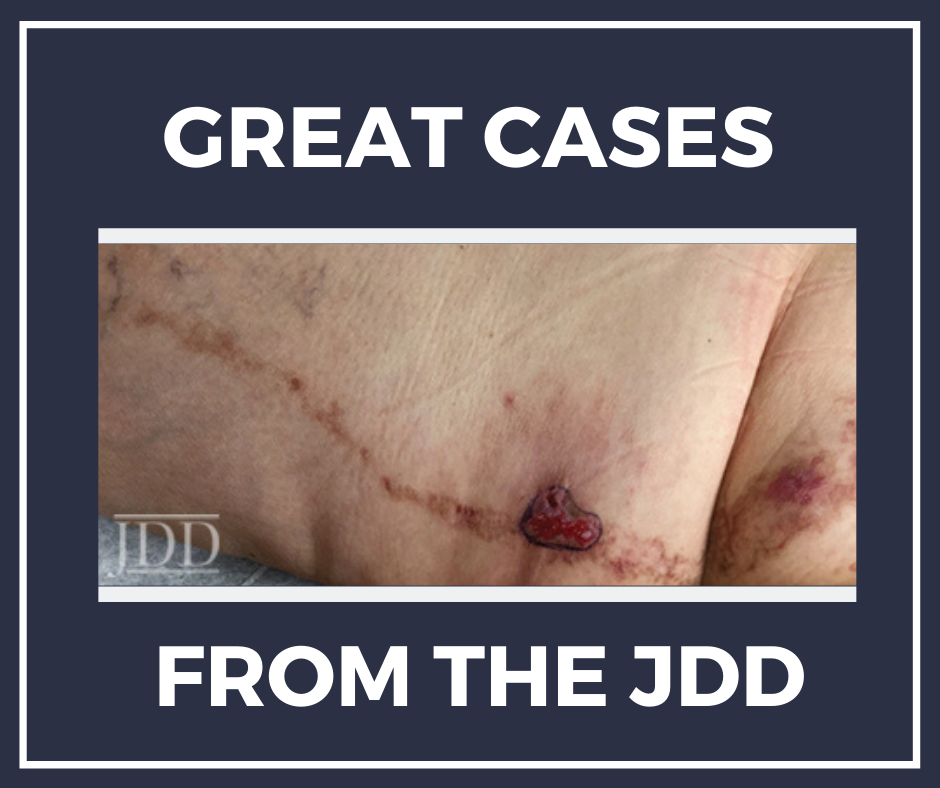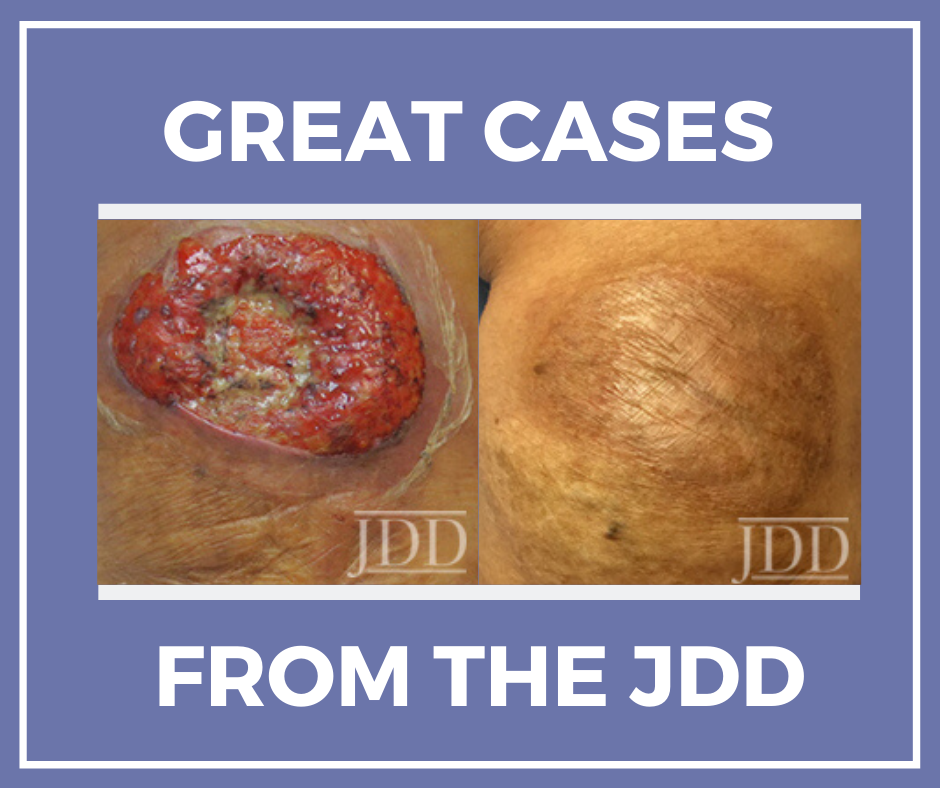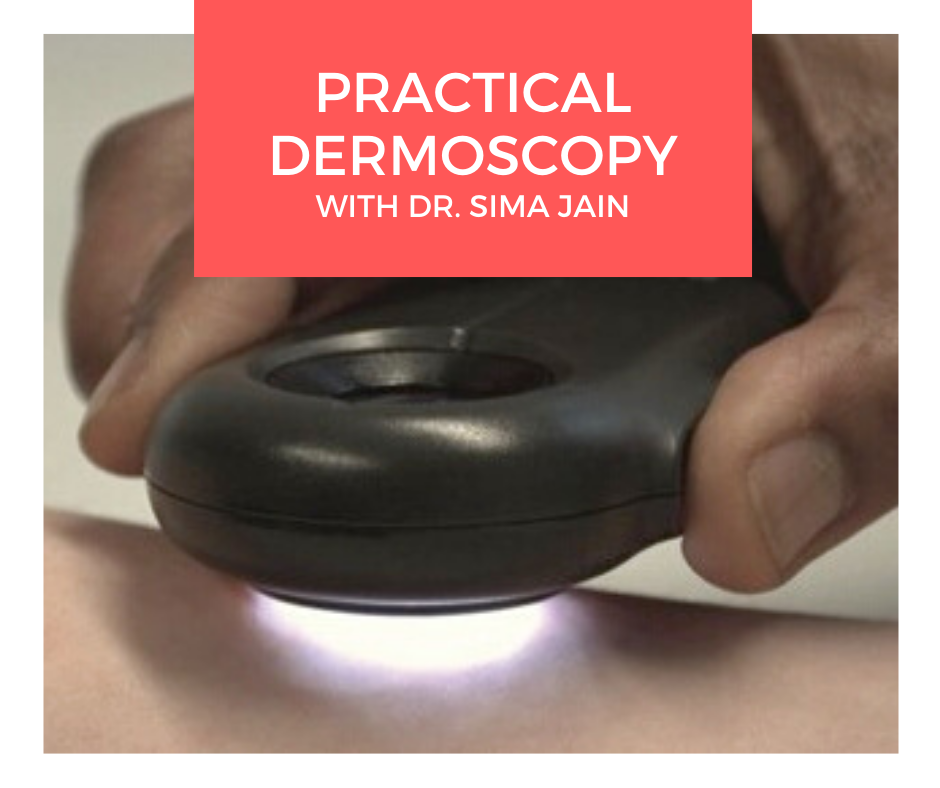Recurrent Squamous Cell Carcinoma Arising Within a Linear Porokeratosis
 JDD authors Amelia M. Abbott-Frey BA, Alexandra J. Coromilas MD, George W. Niedt MD, and Jesse M. Lewin MD report a case of linear porokeratosis with recurrent malignant degeneration to squamous cell carcinoma (SCC) recurring six years after excision of initial SCC.
Case Report
A 79-year-old woman with a history of hypertension and hypothyroidism presented with a friable tumor within a lesion o …
JDD authors Amelia M. Abbott-Frey BA, Alexandra J. Coromilas MD, George W. Niedt MD, and Jesse M. Lewin MD report a case of linear porokeratosis with recurrent malignant degeneration to squamous cell carcinoma (SCC) recurring six years after excision of initial SCC.
Case Report
A 79-year-old woman with a history of hypertension and hypothyroidism presented with a friable tumor within a lesion o …
 JDD authors Amelia M. Abbott-Frey BA, Alexandra J. Coromilas MD, George W. Niedt MD, and Jesse M. Lewin MD report a case of linear porokeratosis with recurrent malignant degeneration to squamous cell carcinoma (SCC) recurring six years after excision of initial SCC.
Case Report
A 79-year-old woman with a history of hypertension and hypothyroidism presented with a friable tumor within a lesion o …
JDD authors Amelia M. Abbott-Frey BA, Alexandra J. Coromilas MD, George W. Niedt MD, and Jesse M. Lewin MD report a case of linear porokeratosis with recurrent malignant degeneration to squamous cell carcinoma (SCC) recurring six years after excision of initial SCC.
Case Report
A 79-year-old woman with a history of hypertension and hypothyroidism presented with a friable tumor within a lesion o … Continue reading "Recurrent Squamous Cell Carcinoma Arising Within a Linear Porokeratosis"


 Becoming a media expert can help grow a dermatology practice. But how and where do you begin? In this 6-part series, Allison Sit, public relations and communications expert, shares valuable advice on how to get started. Read each part of the series below:
Part 1: Five Ways Media Relations Can Help You Build Your Practice
Part 2: When to Hire An Agency
Part 3: Six Steps to Develop a Med …
Becoming a media expert can help grow a dermatology practice. But how and where do you begin? In this 6-part series, Allison Sit, public relations and communications expert, shares valuable advice on how to get started. Read each part of the series below:
Part 1: Five Ways Media Relations Can Help You Build Your Practice
Part 2: When to Hire An Agency
Part 3: Six Steps to Develop a Med …  JDD authors Atrin Toussi BS BA, Stephanie T. Le MD, Virgina R. Barton MD, Chelsea Ma MD, Michelle Y. Cheng MD, Andrea Sukhov MD, Reason Wilken MD, Forum Patel MD, Elizabeth Wang MD, and Emanual Maverakis MD present a case of a 60-year-old woman with recalcitrant pyoderma gangrenosum treated with adalimumab, who paradoxically developed psoriasis.
Introduction
Pyoderma gangrenosum (PG) is …
JDD authors Atrin Toussi BS BA, Stephanie T. Le MD, Virgina R. Barton MD, Chelsea Ma MD, Michelle Y. Cheng MD, Andrea Sukhov MD, Reason Wilken MD, Forum Patel MD, Elizabeth Wang MD, and Emanual Maverakis MD present a case of a 60-year-old woman with recalcitrant pyoderma gangrenosum treated with adalimumab, who paradoxically developed psoriasis.
Introduction
Pyoderma gangrenosum (PG) is …  Dermoscopy, also known as epiluminescence microscopy, epiluminoscopy or skin surface microscopy, is an important way to visualize subsurface structures in the epidermis and dermis. In a 2-part series, Dr. Sima Jain reviews the evaluation of pigmented lesions, and the different vessel morphologies and patterns along with a discussion of specific findings in select cutaneous infections.
Read part …
Dermoscopy, also known as epiluminescence microscopy, epiluminoscopy or skin surface microscopy, is an important way to visualize subsurface structures in the epidermis and dermis. In a 2-part series, Dr. Sima Jain reviews the evaluation of pigmented lesions, and the different vessel morphologies and patterns along with a discussion of specific findings in select cutaneous infections.
Read part …  We’ve all been there – that dreaded middle of the night page/call from the ER. Three simple words that send us spinning: “Rule out TEN.” Have no fear though, because the skin sloughing savoir is here. Inpatient dermatology service director Dr. Helena Pasieka joined JDD podcast host Dr. Adam Friedman to discuss her recent research that elucidates opportunities to prevent offending agent re- …
We’ve all been there – that dreaded middle of the night page/call from the ER. Three simple words that send us spinning: “Rule out TEN.” Have no fear though, because the skin sloughing savoir is here. Inpatient dermatology service director Dr. Helena Pasieka joined JDD podcast host Dr. Adam Friedman to discuss her recent research that elucidates opportunities to prevent offending agent re- …